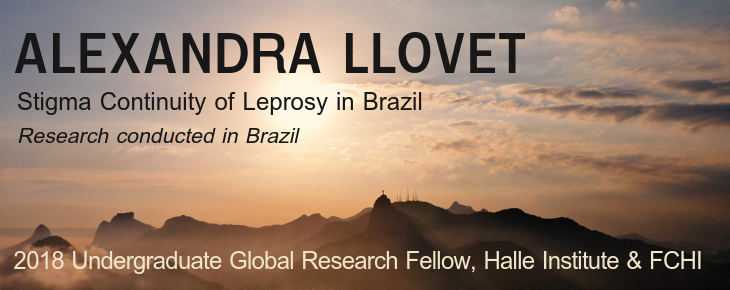
Alexandra Llovet, 2018 Global Research Scholar
Research Project: Stigma Continuity of Leprosy in Brazil
Research Location: Brazil
Majors: Spanish & Portuguese and Biology
|
Why was it important that your research be conducted in the location you chose? My project analyzes the stigma continuity of leprosy in Brazil from 1923 to 2018. Despite political changes and medical advances, the stigma against leprosy persists in Brazil. In fact, the state isolated patients of leprosy in leprosaria for thirty-two years after doctors began to prescribe a cure. The Halle Institute for Global Research funded my time shadowing at the Eduardo Menezes Hospital of Infectious Disease, a specialized center for leprosy. There I observed consults with sixteen patients of leprosy with physical therapists and physicians. Within that week, I also visited a leprosarium that still houses over 200 patients. There, I gathered narratives of patients who suffered isolation. The experience expanded my project from 4 patient narratives to 10 patient narratives in just one week. On this journey, I met a woman in a leprosaria who shared her story with me. She was diagnosed with leprosy when she was just 21 years old in 1955. Immediately, her mother labelled her a dirty sinner for her diagnosis. Her husband, aware that she would live the rest of her days in isolation, went into deep depression. He took his life soon thereafter. She left her baby with her mother while she went to her husband’s funeral. Upon return, the baby was missing. When she asked her mother, her mother said she had sold the baby to some strangers on the street. A couple of days later the police arrived to take the patient away to isolation. This patient lost her husband, daughter, and family because of sickness. I was amazed that despite all she suffered she is not bitter today, and even shares her story openly. The stories contributed to my data collection but also made me reflect on what I am trying to accomplish with my project and inspired future projects. I realized that, beyond writing a thesis, the main goal of my project is to help spread awareness of the discrimination of leprosy patients. In the leprosarium, I met children of leprosy patients seeking reparations from the Brazilian government. From 1923 to 1976, the Brazilian government took the children of leprosy patients and placed them in orphanages. I heard the stories of the traumas of being stripped from their families and made “orphans” by the state. This inspired to document the oral narratives of the children of leprosy patients in the future and conduct research on the impact isolation had on the second generation. |
